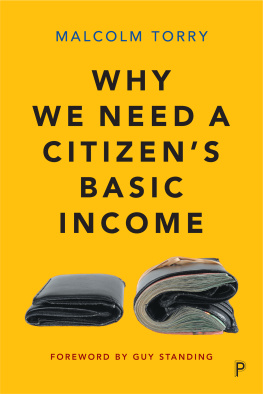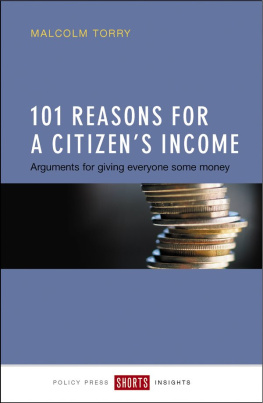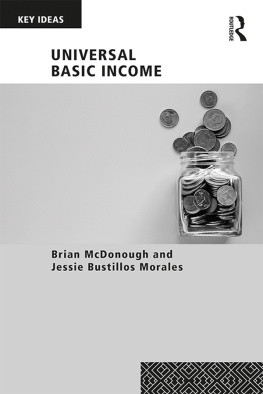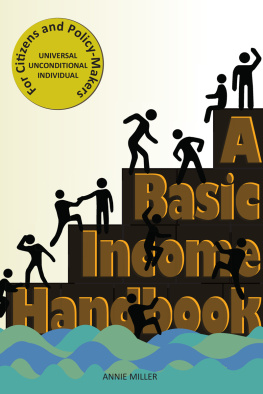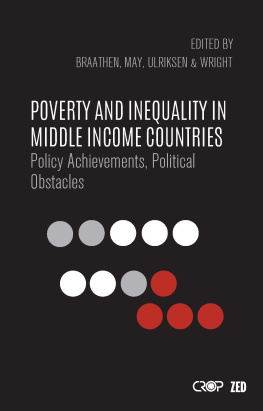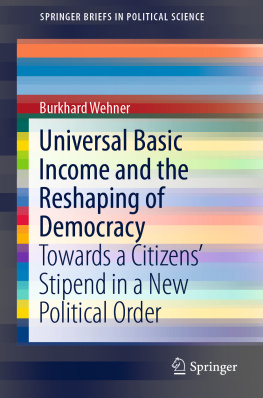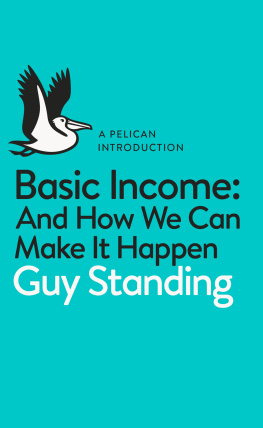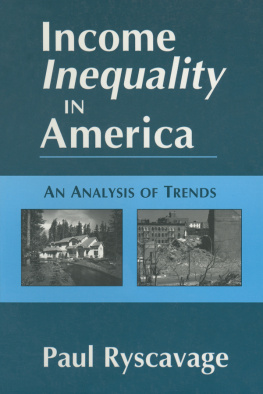First published in Great Britain in 2013 by
Policy Press, University of Bristol, 6th Floor, Howard House, Queens Avenue
Clifton, Bristol BS8 1SD, UK, Tel +44 (0)117 331 4054, Fax +44 (0)117 331 4093, e-mail
North American office: Policy Press, c/o The University of Chicago Press, 1427 East 60th Street, Chicago, IL 60637, USA, t: +1 773 702 7700, f: +1 773-702-9756, e:
Policy Press 2013
British Library Cataloguing in Publication Data
A catalogue record for this book is available from the British Library
Library of Congress Cataloging-in-Publication Data
A catalog record for this book has been requested
ISBN 9781447311270
The right of Malcolm Torry to be identified as author of this work has been asserted by him in accordance with the Copyright, Designs and Patents Act 1988.
All rights reserved: no part of this publication may be reproduced, stored in a retrieval system, or transmitted in any form or by any means, electronic, mechanical, photocopying, recording, or otherwise without the prior permission of Policy Press.
The statements and opinions contained within this publication are solely those of the author and not of the University of Bristol or Policy Press. The University of Bristol and Policy Press disclaim responsibility for any injury to persons or property resulting from any material published in this publication.
Policy Press works to counter discrimination on grounds of gender, race, disability, age and sexuality.
Cover design by Andrew Corbett
Front cover: image kindly supplied by www.alamy.com
This book is dedicated to past and present trustees of the Citizens Income Trust,
and to all of those who have done so much to keep alive the debate on the desirability and feasibility of a Citizens Income.
Contents
BI Basic Income
BIEN Basic Income European Network (now the Basic Income Earth Network)
BIRG Basic Income Research Group
BSP Basic State Pension
CASE Centre for Analysis of Social Exclusion
CI Citizens Income
DWP Department for Work and Pensions
HMRC Her Majestys Revenue and Customs
LSE London School of Economics and Political Science
NHS National Health Service
OECD Organisation for Economic Co-operation and Development
PAYE Pay As You Earn
SEWA Self Employed Womens Association (India)
STP Single-tier State Pension
We start with some notes on terminology and on graphs. offers a brief summary of a Citizens Income and its characteristics.
A note about the related website
One relatively unusual characteristic of this book is that material that might normally have been found in appendices can instead be found on the Citizens Income Trusts website. This material is of two kinds: first, more detailed developments of arguments contained in outline in the book; and second, costings, simulations and other calculations, which can quickly go out of date and will therefore need to be regularly updated.
All of this material will be found at www.citizensincome.org
A note on terminology
Terminology can be quite specific to its context, so the same word might mean quite different things in different countries. I base the following discussion on English as spoken in the UK, and where appropriate I discuss variations.
Universal benefits I take universal benefits to mean unconditional and non-withdrawable cash payments made to every individual citizen as a right of citizenship. In the UK, Child Benefit is restricted to children up to the age of 16 (older if still in education or training), so it is not strictly universal, and it is paid at different rates to the first and to subsequent children, so it is not strictly unconditional, but otherwise it fits the definition because equal amounts are paid to every main carer of the same number of children regardless of those carers incomes, employment status, household structure or any other factor. I call Child Benefit universal because it is paid for every member of an age-defined demographic group without condition, and no change of circumstances can cause its withdrawal.
Citizens Income and Basic Income By Citizens Income I mean a genuinely universal, unconditional, and non-withdrawable income paid to every individual citizen simply by virtue of their status as a citizen. (We come to the meaning of citizen in .) Another name for Citizens Income is Basic Income. In English as spoken in the UK the word basic can have derogatory overtones, so I choose not to use it. Similar words in other Germanic languages do not carry such overtones, and the same word in non-UK English might not, so in some countries Basic Income can be a useful alternative to Citizens Income. I stick to Citizens Income. It describes what the benefit is: it is for every citizen, unconditionally.
Guarantee Some authors incorporate the word guarantee into the name, as in Basic Income Guarantee. I avoid guarantee language for two reasons:
- The previous Labour government established a Minimum Income Guarantee, later called a Guarantee Credit, for pensioners, a means-tested payment to bring their household income up to a prescribed level. This is as far from a universal benefit as it is possible to get.
- The academic literature uses the term minimum income guarantee for a prescribed level of net income to which a household is raised by a payment dependent on the level of earned income. For instance, James Meade formulated his Modified Social Dividend proposal in terms of a universal benefit (a Social Dividend) and an additional means-tested payment to bring an individual up to a minimum income guarantee. While the Social Dividend might be a Citizens Income, the means-tested supplement certainly is not.
We need to take care over several other terms.
Allowance Child allowance, family allowance or simply allowance refers to payments made to an individual or household (in the case of child allowances, on behalf of the child to the main carer). Income Tax allowance or tax allowance refers to an amount of earned income on which tax is not charged, tax only being charged on income above the tax threshold.
Tax Credit A Tax Credit is an amount of money ascribed to an individual, usually weekly. It is paid in full if an individual has no other income, and it is withdrawn at a specified rate as earned income rises. As earned income continues to rise, the Tax Credit ceases to be paid, and the worker starts to pay Income Tax. If the individual is working and receiving a Tax Credit rather than paying Income Tax then the employer manages the Tax Credit. The Tax Credits implemented by the last UK Labour government are not Tax Credits: they are a means-tested benefit. Until 2005, Working Tax Credits were paid through the employer-administered PAYE (pay as you earn) Income Tax system, but were calculated separately from Income Tax. It could not have been otherwise, because, in the UK, Income Tax is calculated in an individual basis, whereas for Tax Credits the household is the claimant unit. Since 2005, all Tax Credits have been paid into peoples bank accounts. They are not in any way integrated with the payment of wages or Income Tax, and they are withdrawn if a spouses earned income rises. Genuine Tax Credits are not withdrawn in this way. In order to distinguish between the two very different uses of the same term, I place quotation marks around Tax Credit when the term is used with the meaning of means-tested benefit, and not when the term means a Tax Credit.
Marginal deduction rate An important term employed throughout the book is marginal deduction rate. If someone already earning above the Income Tax threshold earns an extra 1 then they are not better off by 1. First of all, Income Tax and National Insurance Contributions will be deducted. If the household is on Housing Benefit, then the Housing Benefit will be reduced if earnings rise. If they are on Tax Credits then those will be reduced because earnings have risen. Let us suppose that after all of these deductions the worker finds him or herself 30p better off. This means that 70p has been deducted, a marginal deduction rate of 70 per cent. It is a marginal deduction rate because it relates to additional earnings. The marginal deduction rate is important because it affects incentives to earn additional income. If the marginal deduction rate is low that is, if not much of ones additional earnings is lost through the tax and benefits systems then it is more worthwhile to earn additional income than if the marginal deduction rate is high.


